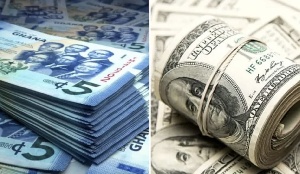- Home - News
- Elections 2024
- News Archive
- Crime & Punishment
- Politics
- Regional
- Editorial
- Health
- Ghanaians Abroad
- Tabloid
- Africa
- Religion
- Photo Archives
- Press Release
General News of Friday, 9 May 2025
Source: www.ghanawebbers.com
Cedi gains global spotlight, but Centre for Policy Scrutiny warns of fragile foundations
The cedi has recently been recognized as one of the best-performing currencies globally. This has garnered praise from businesses and policymakers.
However, a new paper from the Centre for Policy Scrutiny (CPS) raises concerns. The paper is titled “Ghana's Cedi Holds Steady - But Can the Calm Last?” It warns that the cedi's impressive performance may be fragile. CPS calls for urgent structural reforms to ensure sustainability.
The cedi appreciated from GH¢15.50 to GH¢13.30 against the U.S. dollar in recent weeks. This rise is attributed to several factors: a weakening U.S. dollar, improved gold reserves, reduced government spending, and investor optimism.
Despite this positive trend, CPS argues these factors may not last long-term without deeper economic reforms. They note that lower debt servicing and constrained public expenditure are temporary solutions.
The accompanying figure shows the cedi's performance against major currencies since January 2025.
Respite for Business, but Caution Lingers
The Ghana Union of Traders Association (GUTA) praised the Bank of Ghana and the government. They noted that the cedi’s stability has boosted business confidence significantly.
With less exchange rate volatility, many import-dependent businesses report better pricing predictability. This could lead to a recovery of lost capital as well.
A stronger cedi also helps fight inflation. CPS notes that imported inflation is easing, contributing to lower overall inflation since January. Ghanaians may soon see some relief in their cost of living.
International investors are taking notice too. Gross international reserves rose to $9.4 billion in March, up from $6.2 billion last year. Ghana is now seen as a more stable destination for investment.
Despite this optimism, CPS warns about potential risks associated with a stronger currency. A stronger cedi can hurt export competitiveness by making goods more expensive abroad.
There’s also a risk of increased imports undermining local industries and widening the trade deficit.
Another concern is reduced value in foreign remittances for families relying on support from abroad. As the cedi strengthens, they receive less in local currency, which could dampen household consumption and slow domestic demand.
Recommendations for Sustainability
CPS identifies sustainability as the biggest threat to current gains and recommends several strategies:
1. Expand Domestic Gold Purchasing: The Bank of Ghana’s gold reserves have increased significantly—from 8.78 tonnes in 2023 to 31.37 tonnes in April 2025—an increase of 257%. CPS urges scaling up this effort further.
2. Prioritize Import-Substitution: Ghana should reduce its dependence on foreign goods by implementing local production policies more quickly.
3. Reinforce Fiscal Discipline: Stricter controls on public spending and improved revenue mobilization are essential to prevent excessive deficits that could weaken the currency.
4. Maintain Tight Monetary Policy: Keeping inflation and liquidity under control will be crucial for long-term stability of the cedi.
CPS emphasizes that while the cedi's current position is commendable, complacency is not an option now. They argue that “Stability of the cedi is non-negotiable.” It’s time for bold policy choices to make it sustainably strong—not just defend it at all costs.











